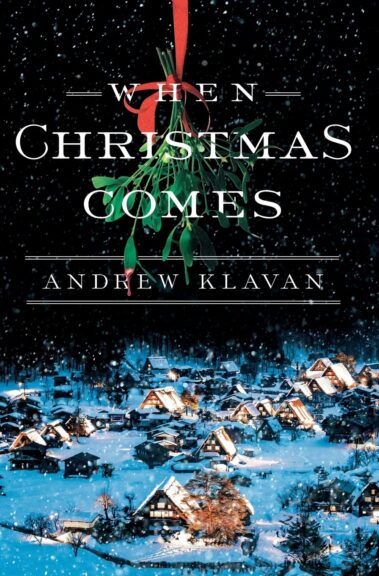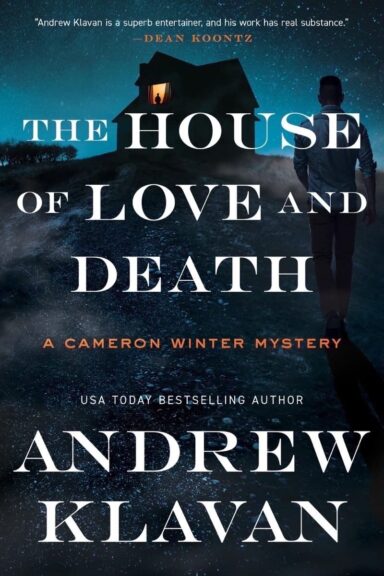While ruminating on his life’s work for The Atlantic in 1944, Raymond Chandler noted that “in everything that can be called art there is a quality of redemption.” He explained that it is no less true for hardboiled detectives like his creation, Philip Marlowe, than it is for tragic Greek heroes. Perhaps even more so, as the world-weary private eye is generally well aware of the misfortune his profession is likely to bring down on his head but chooses it anyway for the chance to bring a little justice to an unjust world.
Cameron Winter, the poetry-loving assassin-turned-detective at the heart of Andrew Klavan’s eponymous mystery series would have understood exactly what Chandler meant.
Klavan’s creation of Winter and his redemptive arc began when his friend Otto Penzler, the legendary mystery editor who’s worked with everyone from Elmore Leonard to Mary Higgins Clark, called him at the height of the pandemic asking for a Christmas novella. He knew it was the perfect opportunity to write the detective story that had been lurking in his mind for decades. The problem was — he’d never been able to get the story out of his mind and onto the page because he couldn’t quite nail down his leading man.
“For me, a story is not a full story until I have the exact right character to be in it,” Klavan says. And so, the tale, which he expects to cover ten books, remained an idea, something he knew he would pursue someday when he had a clearer image of the character who could carry it. It wasn’t until he reflected back on his 40-year crime-writing career — which twice netted him the Edgar award, the most prestigious prize in the genre — and asked himself what inspired his passion for detective fiction that he realized he at last had his man.

Courtesy Mysterious Press
“I’d just reached that stage where you kind of want to sum up,” he says. “You kind of want to look back at everything you’ve been doing and say, ‘What is this all about? What have I been talking about all this time?’” He thought back to the scene from Chandler’s classic “The Big Sleep” that had spurred him to try his hand at crime fiction in the first place. At a pivotal moment during Marlowe’s visit to a client’s mansion, the detective looks up and sees a stained-glass window depicting a knight rescuing a fair maiden. Marlowe thinks to himself, “If I lived in the house, I would sooner or later have to climb up there and help him. He didn’t seem to be really trying.” For Klavan, the moment revealed Marlowe’s longing to be a good man, a hero, even in an era where, compared to knights in shining armor, heroism has been rendered obsolete.
“I thought at the time that here’s a guy, he’s a shabby little man. He’s a private detective. He’s not rich,” says Klavan, “he doesn’t have any kind of class or anything like that. And he’s living in corrupt Los Angeles, but he carries this idea of chivalry inside him. And he’s not a fool—he knows this is going to get him kicked around and beaten up. And he’s going to be attacked and hurt and endangered because of it, but he’s still going to carry this thing around.”
And so Klavan invented Winter to explore a man whose capacity for violence is offset by a deep moral core that reveres Western ideals, especially as they are expressed through poetry. Winter’s inner conflict reaches a tipping point when it’s no longer clear that his country for which he has killed still upholds those Western ideals. “Did Winter do the right thing when he killed people out of patriotism?” Klavan asks. “And what should he do going forward as his nation loses the values that he loves? That’s what I’m trying to discover — what does a man do when the things that he loves exist only inside him and have fallen apart in the world outside?”
Or, as Chandler put it, “Down these mean streets a man must go who is not himself mean, who is neither tarnished nor afraid.”
In “The House of Love and Death,” the third installment of the Cameron Winter mysteries which hits bookshelves today, Winter grapples even more forcefully with the fact that his adaptability to mean streets is preventing him from finding the love he longs for. An item in the paper about the murder of a family in a tiny Chicago suburb fixates him. The local sheriff is content to accept that the daughter’s boyfriend, whose father is connected to a Mexican drug running gang, is the culprit. But Winter can’t believe the young Romeo is capable of such violence.

Courtesy Mysterious Press
The romantic entanglements of the other victims, including the psychologist father and his socialite wife, prompt the detective to look elsewhere for answers. At the same time, Winter’s therapist helps him grapple with the fact that his obsession with getting to the bottom of such mysteries is part of his inner journey to discover if he’s still a good man, capable of loving and being loved. As Winter puts it, “Sometimes I thought I was the coolest hero outside the movies. Other times I figured I was what the recruiter said I was—a crazed killer, corrupted by the yearning for manly heroism in an unheroic age…”
Winter’s quest to find redemption is, for Klavan, the deeper theme beneath his detective story.
“Breaking Bad, The Shield. The Sopranos — almost all of the great stories that arose out of our recent golden age of television were shows about bad men, in which men expressed genuine masculinity but did it through the commission of evil deeds,” Klavan tells me. “And I thought to myself, we’ve essentially outlawed masculinity. The only way that a man can be an actual man is to be a bad man. And so those are the only stories we have left to tell. I very consciously wanted to take a guy who had been who had been in some sense the bad man, but is now thinking, ‘Alright, how do I get back? How does America get back to being America today? With masculinity being as condemned as it is, how do I now build a manhood and a life that I can be proud of?’”
Whether Klavan allows Winter to find redemption in “The House of Love and Death” or in some later story, Chandler would be proud.

.png)
.png)

